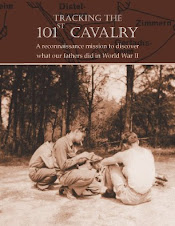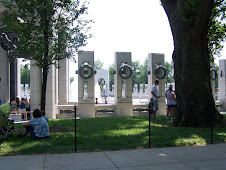The dead at Kaufering IV. A photo taken April 1945 by Robert Klein.
Sixty-five years ago this week, on April 28, 1945, the 101st Cavalry was in the vicinity of Landsberg and Kaufering, two small villages in Bavaria. They were waiting for engineers to rebuild a bridge across the Lech River. When the bridge was completed, Troops A and B of the 116th Squadron were among the first to cross. As they moved through the woods, they encountered wire-enclosed camps with hundreds—by some accounts thousands—of bodies scattered around the grounds.
Sgt. Robert Klein remembers when he first got word of what lay ahead. "We had two radios on our half-track," he said, "one to the platoon, which was primarily a voice radio, and a larger radio that was continuous wave—morse code—and voice. It went to squadron headquarters."
Most of their messages came through coded, but that day they got an uncoded call from the colonel.
"Let me talk to Ulmschneider," the colonel said.
"I asked him for the password," said Klein, "and he just yelled, ‘Klein! I said let me talk to Ulmschneider.’ I recognized his voice—and his tone—so I gave the phone to Ulmschneider."
The colonel gave Klein’s crew directions and told them to hurry. Following the colonel’s directions, they soon pulled up in front of a large fenced area.
“We saw men hanging on the fence in striped suits,” Klein said. “They were starving, so we shared some of our K rations, but it made them sick. Some of the people were eating grass they were so hungry.”
Earl Carmickle remembers a big deer ran through one of the camps, and he shot it. “The people were so hungry they just fell on it,” he said, “and they started skinning it. I thought I might be in trouble, but no one said anything.”
Altogether, at least seven camps were located in the area. The barely living still inhabited Kaufering I and VII, but more than 300 bodies covered the ground in Kaufering IV, the typhus camp. It was here that the fleeing Germans set fire to the huts still filled with prisoners, and where American soldiers walked into a hell of smoldering wood and humanity.
Henry Dressler was a survivor of the Landsberg camps. I found him through his son, Murray Dressler, who had written a note about his father on a website dedicated to keeping the memory of these camps alive.
Henry Dressler's voice is deep and strong, a serious voice, with no hint of softness. He tells his story as if he has told it a hundred times before.
"The German citizens, the people who lived in Landsberg and Kaufering, they saw us each day," he said. "They watched us go to work and called us bad names. We would see them standing in front of their houses laughing. They knew. They saw it. And they just stood laughing and making jokes. They knew exactly who we were – ‘Juden,’ they called us. Everyone knew. After the war, no one knew anything.
"It wasn’t easy to deal with it all. But we were so hungry, we only thought of food. We were sick and isolated. We had a little watery soup. Everyone ate it and everyone got sick. The Germans were afraid of our sickness, so they would stay away from us. The capos did everything.
"We didn’t know the Americans were coming until the day they came. One day in late April the Germans gave us a piece of bread and lined us up for our ‘last march.’ Then a high officer came and said it was too late, that we couldn’t leave. That night we heard shooting and bombardments, and the next day the Germans were gone.
"When we woke up on the morning of April 27, we went out like we always did to be counted, and the camp was empty and the gates were open. We were free. The Germans had left their tanks, trucks, everything."
The Americans who came as the Germans left were horrified by what they saw, but passed through so quickly that to many it just seemed like a bad dream, something best forgotten.
Lou Gergley, B Troop, said, “We were about the eighth or tenth car in line going by one of the camps. I remember the people were all bald and so thin. Lt. Borkowski put a handkerchief on one of the men there and designated him as a leader. He got the people cleared off the road so we could go through."
“We just went in and out of the camps,” said Buck Fluharty. “It wasn’t our job to do anything. Another unit cleaned it up.”
“We didn’t stay long—maybe about half an hour,” Klein said, “then had to head off on another mission.”
“I don’t want to remember the camps,” said John Gorski. “One of the priests with us came up to me and said, ‘John, I want to show you something. You’re never going to forget this.’ And he took me to one of those camps. What I saw, I did never forget. I’m sorry I went with him.”






1 comment:
Hi! I had been searching for this site for a few years. I think originally you had some of this information with a different web address; a roster of the 01st and 116th reunion as well as an accounting of the actions by both.
I was interested in learning more about what my uncle did in WWII as he would not speak of those days to anyone because it hurt him to be reminded of that time in his life. And now I know why. You have quoted my Uncle, John Gorski, in this post, and his few words speak volumes of his experiences during WWII:
"What I saw, I never did forget. I'm sorry I went with him."
My uncle passed away in April this year, and I believe he never did forget.
Thank you for creating this site.
Post a Comment